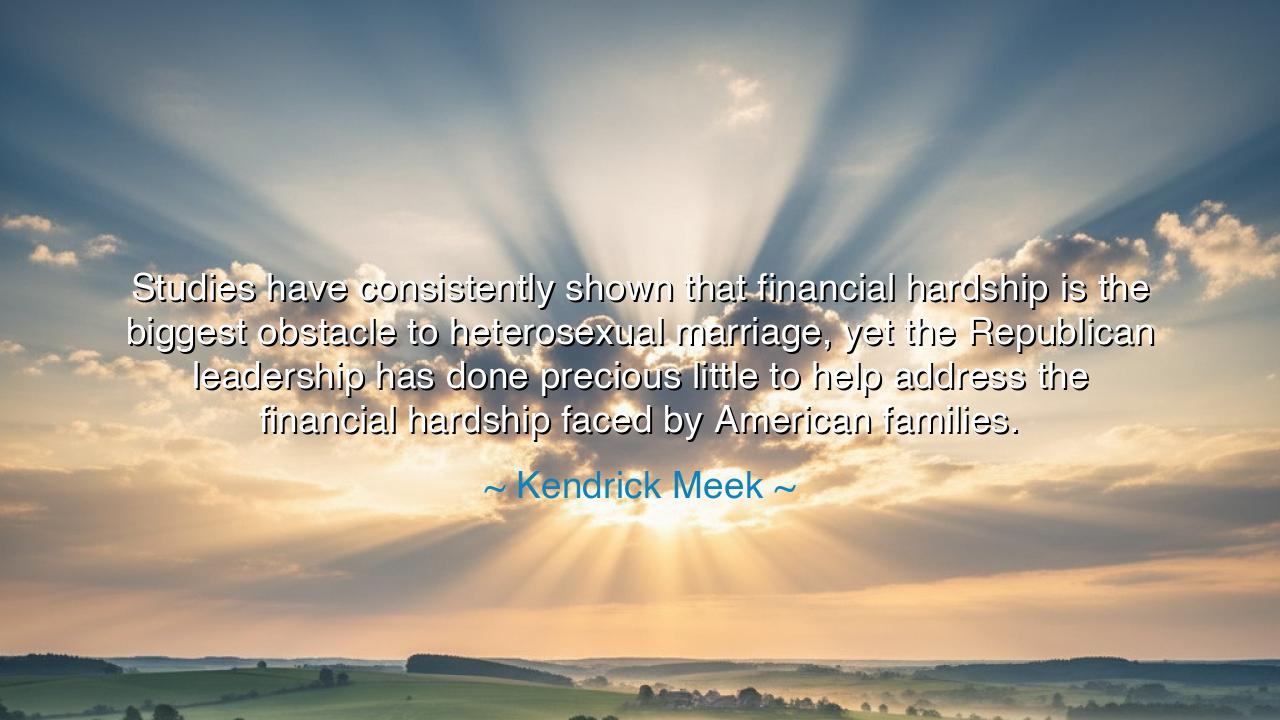
Studies have consistently shown that financial hardship is the
Studies have consistently shown that financial hardship is the biggest obstacle to heterosexual marriage, yet the Republican leadership has done precious little to help address the financial hardship faced by American families.






When Kendrick Meek declared, “Studies have consistently shown that financial hardship is the biggest obstacle to heterosexual marriage, yet the Republican leadership has done precious little to help address the financial hardship faced by American families,” he was not merely speaking of economics or politics — he was speaking of the foundation of society itself. His words are a lament for a time when love and commitment were the cornerstones of family, and a warning that the burdens of poverty and inequality have begun to erode those sacred stones. Beneath his statement lies an ancient truth: that no nation can thrive if its families are crushed beneath the weight of economic struggle, and no love can fully flourish when anxiety and debt choke the spirit.
The origin of this quote lies in Meek’s work as a legislator and advocate during the early 21st century, when widening inequality and stagnant wages weighed heavily upon the American middle class. He saw that while leaders spoke of “family values,” few addressed the material conditions that allowed families to form and endure. Marriage, in his view, was not merely a moral or social contract, but also an economic covenant — one that demanded stability, security, and shared opportunity. The ancient poets understood this too: love is not sustained by sentiment alone, but by the peace that comes when daily bread is assured, and when hope outweighs fear.
To say that financial hardship is the greatest obstacle to marriage is to recognize a deep and uncomfortable truth about the modern world. In every age, the strength of families has rested upon the soil of prosperity. In ancient times, the wise rulers of the East and West understood this. Solon of Athens, the great lawgiver, instituted reforms to release citizens from crushing debt, knowing that despair and poverty led not only to rebellion, but to the breakdown of home and hearth. For how can a man build a family if he cannot feed one? How can a woman dream of children if the future offers only uncertainty? Meek’s observation is a modern echo of Solon’s wisdom — that the health of a people is measured not by the splendor of their rulers, but by the dignity of their homes.
There is a kind of irony, even tragedy, in Meek’s rebuke. For in his words, he exposes the gulf between political rhetoric and moral responsibility. To champion the sanctity of marriage while neglecting the struggles that prevent marriage from flourishing is to tend to the leaves of a tree while letting its roots wither. True leadership, he implies, is not in grand speeches about virtue, but in the quiet, persistent labor of creating conditions where virtue can thrive — where work is fair, wages are just, and families have the freedom to dream. It is not the creed of a party that defines greatness, but the care of its people.
Throughout history, the downfall of societies has often followed the neglect of the common household. The Roman Republic, for all its power, began to decay when wealth became concentrated in the hands of the few, and the small farmer — the heart of the Roman family — was driven from his land. The result was not merely economic collapse, but moral fragmentation. When the home weakens, the state follows. Kendrick Meek’s warning, though cast in the context of modern America, carries the same ancient resonance: that when the burdens of survival outweigh the joy of companionship, love itself becomes a casualty of policy.
Yet his message is not one of despair. Hidden within it is a call to renewal. For if financial hardship can weaken families, then compassion, justice, and shared purpose can strengthen them. The path forward lies not in division, but in unity — in leaders who see beyond ideology and remember that every budget is also a moral document, every economic policy a reflection of what a society values most. To restore the health of families, we must restore the dignity of work, the fairness of opportunity, and the hope that tomorrow will be better than today.
And so, let the lesson endure: love cannot live on words alone. It needs the soil of security, the light of opportunity, and the rain of justice. For every family struggling to endure the storms of hardship, society bears a duty — to lift, not to judge; to build, not to boast. As Kendrick Meek reminds us, the true measure of leadership is not in how loudly it speaks of values, but in how faithfully it helps people live them. When a nation learns this, then its families will rise again — and with them, the heart of civilization itself.






AAdministratorAdministrator
Welcome, honored guests. Please leave a comment, we will respond soon